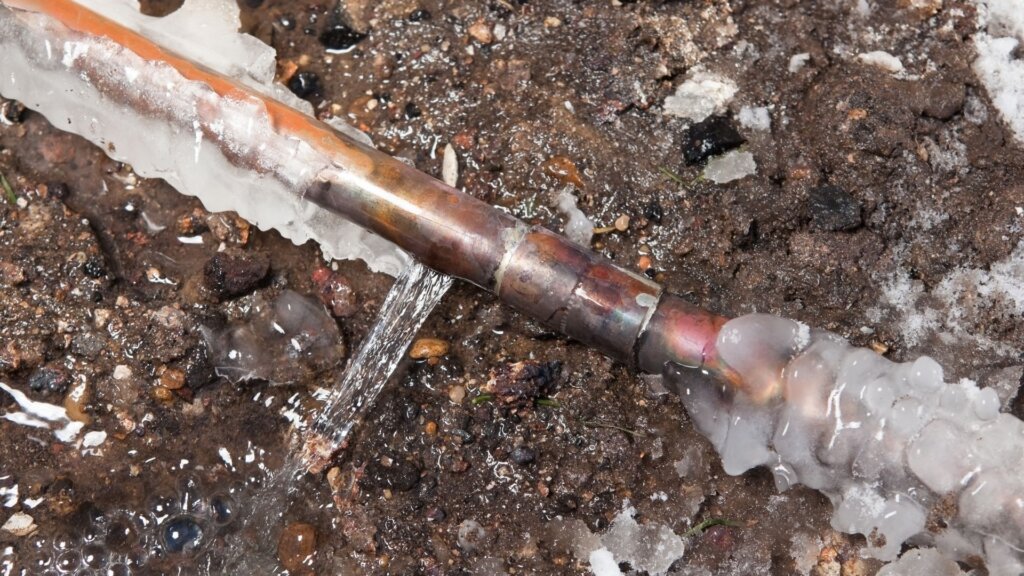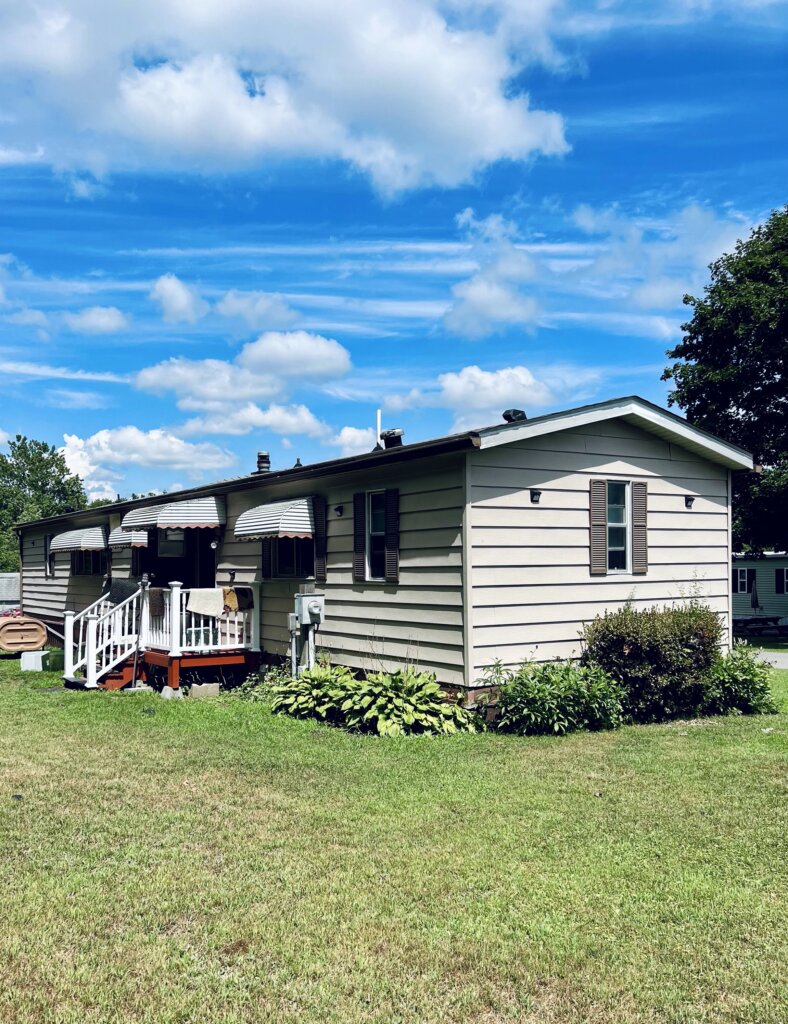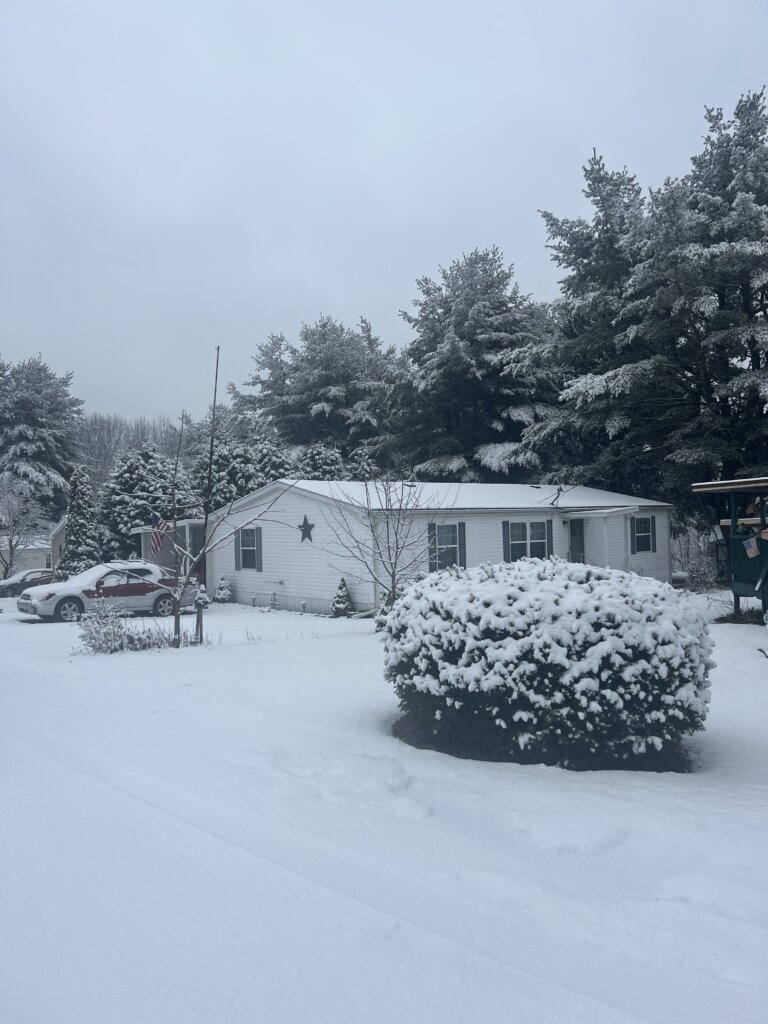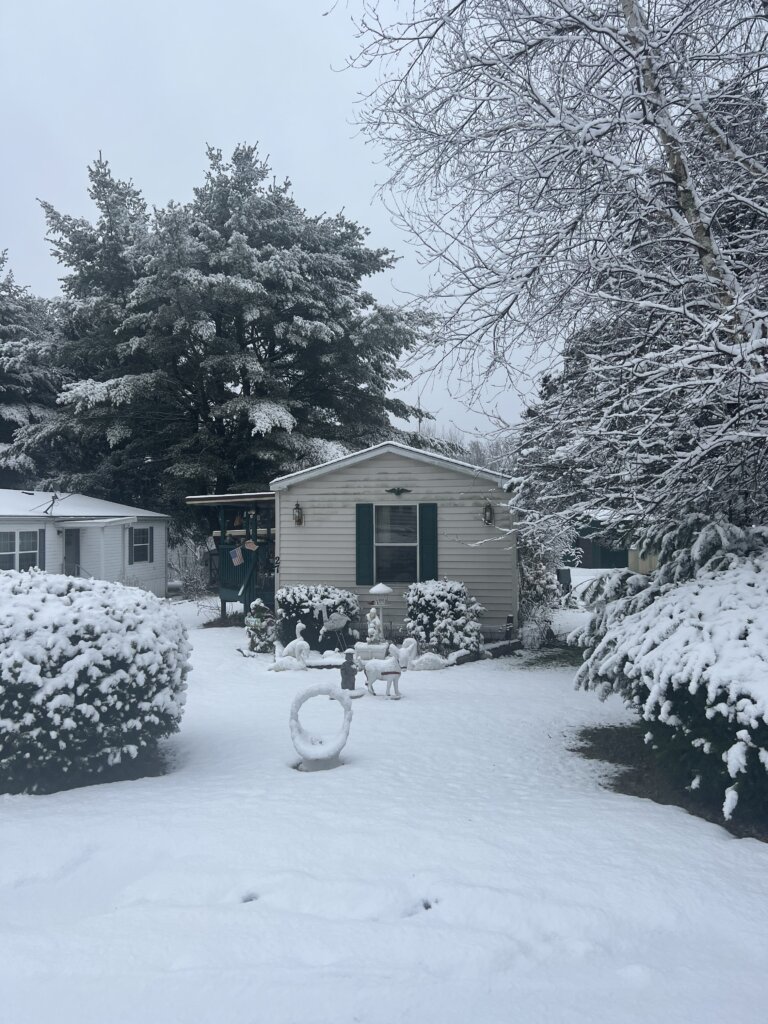Mobile home pipes are vulnerable to freezing. Why is that? Simple, they are located under the home where the air is colder. Frozen pipes in mobile homes are common issues, and if you’re dealing with them for the first time, just know it won’t be your last. How to Unfreeze Pipes in a Mobile Home? Read on to learn how to unfreeze your pipes and sell a mobile home in winter.
A frozen pipe can inhibit you and your family from getting a regular water supply. In addition, it can cause more damage to your mobile home.
For example, the repair cost can be high, and the fact that you need water, you’ll be left with no choice.
You don’t have to pay the price of significant damage to your mobile home when unfreezing the pipes can be a DIY project at home. Learning how to repair the mobile home frozen pipes can save you from paying a couple of bucks to plumbers.

How to Unfreeze Pipes in a Mobile Home
Even though the task may sound complicated, unfreezing the pipe is somewhat a doable task.
The beauty of mobile homes is that you don’t have to ruin your walls or floor to access the pipes and fix them.
If you’re ready to learn how to unfreeze pipes in your manufactured home, you’ll not only save some money, but also spare yourself from the morning or late evening calls to your plumber.
If you want to learn about fixing frozen pipes, take a look at our guide below.
Sell Your Mobile or Manufactured Home On Your Terms
How to Locate the Frozen Pipes
Perhaps the most challenging task is identifying the frozen pipes in your mobile home. It’s nearly impossible to solve a problem when you have no idea where the source is, right?
That said, you need to identify the root problem before beginning any troubleshooting procedure. Hopefully, you have a sketch or blueprint of your home’s plumbing system. If so, that will come in handy, but if you don’t, that’s okay, too.
The most apparent sign of frozen pipes is your faucet not producing water. Fixing frozen pipes will be easy if you know which pipes are causing problems. With that in mind, turn on all of the taps in your mobile home.
If none of the faucets are producing water, the most likely conclusion is that the root problem could be from your main water supply, in other words, where all your pipes meet.
Suppose your bathroom faucet works pretty well, but the kitchen faucet doesn’t. Well, in this case, the problem could be right beneath the kitchen in your supply line.
You may not have x-ray eyes, but there are practical ways to spot frozen pipes without struggle.
Here are a few tips on how to identify frozen pipes in mobile homes:
- If you find leaks and cracks along your pipes, this might indicate that pipes have frozen over and cracked under the ice pressure. If this is the case, turn off the main valve and replace the damaged pipe as soon as possible.
- Suppose you leave your faucets on and run your hands over the pipes. You might be able to feel the parts with running water and where there is no running water. Particularly cold areas could be a sign of ice.
- You may want to use an infrared thermometer to detect areas of the pipe that are much colder than other areas.
- Try hitting the pipes with a solid object, for example, a screwdriver, at regular intervals as you move along it. A frozen section of the pipe will make a different, less hollow sound than unfrozen sections.
Once you have identified the root problem with your mobile home, it’s time to fix them. Here are several ways on how you can fix your frozen pipes.
- Use salt for thawing frozen pipes
- Use a hair dryer or heat gun
- Wrap pipes in hot towels
- Apply heat tape to the pipes
Use salt for thawing frozen pipes
The first thing you may want to try is salt to thaw the frozen pipes in your mobile home. What magic can salt do to your pipes?
Well, salt lowers the freezing point of ice, and thus salt can defrost your pipes way more effectively, even in comparison to more “aggressive” ways, such as heating.
Now, pour salt down the drain directly. For this method (pouring salt) to work effectively, you might want to dissolve the salt in warm water before pouring it down the drain.
However, it is crucial that you don’t use extremely hot water. High temperatures from hot water can damage the pipes, causing more problems.
If this method doesn’t seem appealing to you, check out what’s next in our tips list.
Use a hair dryer or heat gun
Even though applying a heat gun might sound cool, it’s a sensitive procedure that requires your attention. You don’t want to apply too much heat and damage the pipes.
To use this tool properly, we recommend you keep the heat at the level of 125 degrees fahrenheit to 150 degrees fahrenheit.
Armed with your heat gun, point it towards the frozen water pipes; however, not too close. Wait until it starts defrosting.
Repeat the process in other affected areas as well, and soon you’ll have water running in your kitchen once again.
There are chances you might not have a heat gun lying around, well that’s okay. You can use a hair dryer as a substitute and still achieve the same goal. Similarly, don’t point the hair dryer so close to the frozen area.
Wrap pipes in hot towels
This approach might be a little cumbersome compared to other techniques we shared above. It may sound crazy at first, but those who have used this method before have testified it works.
Armed with a bucket of warm water and a couple of towels, wet the towels, wring them out, and wrap them around the frozen pipes. Make sure the towels are warm to the touch; if not, this technique will flop.
In addition, you will have to replace the towels every ten minutes, so this method will probably not suit those who lack patience or time.
Apply heat tape to the pipes
One of the easiest ways to keep your pipes from freezing is by use of electrical heating tape. These tapes have heating elements on its interior that warms anything it comes in contact with.
Typically, electrical heating tape is applied in a spiral pattern over the length of the pipe, ensuring that the tape does not touch or overlap itself. With that said, be sure to follow the instructions included with your tape.
In addition, you can also use a pipe heating cable. All you need to do is plug it in, wrap it around the frozen area and unfreeze your pipes in minutes.
How to Unfreeze Pipes in Walls
Breaking your wall and floor is probably not something you might want to do anytime soon. With that said, unfreezing pipes in the walls or floor can be a challenging venture.
For this reason, you need to be patient and tread carefully, not to cause more damage. However, by narrowing down to the part that seems the problem lies, you can localize your efforts and expedite the unfreezing and thawing out process.
Some of these methods can help you do just that.
- In conjunction with some other techniques, you can expedite the unfreezing of your manufactured home’s plumbing system by turning on your central heating.
Since the temperature needs to be set high, it’s a good idea not to be in your home during the process. To allow the heat to travel to the pipes quicker, move furniture or open cabinet doors that may be blocking the walls.
- A space heater will help heat any frozen pipe. If there are any vents or openings nearby, pointing the space heater toward those will be more effective, but merely switching on a space heater near the wall with the affected pipes will be helpful, nonetheless.
Be careful, though, since space heaters can be a fire hazard. Keeping an eye on space heaters is a must.
How to Keep Pipes from Freezing in Cold Weather
Preventing your mobile home pipes from freezing will always be better than fixing them. That said, there are practical ways that you can apply and spare yourself from frozen pipes the next time-temperatures plummet.
Replacing your mobile home piping can be a costly affair. That’s why you must take the following steps to winterize a mobile home.
Repair your skirting
The first thing is to make sure the skirting on your mobile home is in place correctly. Skirting protects the bottom of your mobile home. If the skirting is damaged, it will allow snow, water and cold air into the underbelly of your manufactured home.
Ideally, you should regularly check all skirting around the entirety of the mobile home. It’s the only way to be sure skirting won’t be the culprit to freeze your pipes.
Maintain your plumbing regularly
Pipes that are poorly maintained are vulnerable to freezing. That said, if you need to add a new heat tape, go ahead and do it.
Insulate the problem pipes
If you know that a particular pipe or pipes tend to freeze in winter, take care of them beforehand by wrapping insulation around to keep them warm. Use fibreglass, foam, or any other approved material you can find.
Drain your pipes before winter
If your home is going to be vacant for a while, it’s recommended that you flush all water from the system and turn off your main water line.
Turning off your main water line will save you from frozen pipes.
Keep your faucets dripping
This might not be exactly what you want to hear, as far as a utility bill is concerned.
If temperatures are expected to drop, keep your faucets dripping. This will prevent standing water in the pipes, which is what causes pipes to freeze.
Check your water riser and main water line
Make sure your water riser and main water line are insulated. For this reason, apply working heat tape that you keep running during cold weather.
As said earlier, prevention is better than cure. Take necessary precautions before winter arrives. It’s only natural to escape the burden of having to pay your plumber when you can take the proper measures into your own hands.
Should You Call Your Maintenance People?
Suppose you bought a new mobile home, and maybe it’s your first time in a winter setting, and one of your pipes froze. Naturally, if your pipes are frozen you’re likely to be stuck and short of ideas of what to do next.
Trying to figure out if you should call the maintenance crew can be challenging. The good news is that many mobile home communities will be happy to help people new to trailer life.
Suppose you find yourself in such a situation (pipes freeze). In that case, it’s only necessary to call out for help from people with a wealth of experience in dealing with a frozen pipe and, generally, the plumbing situation.
Whether you call the maintenance crew or your immediate neighbor, it doesn’t matter. The most important thing is to get the problem fixed as soon as possible before the damage escalates. If you delay, you’re likely to pay a steep price.
Testimonials
“Natalya and her team did their best to help me with selling my home. It was on the market for almost two months before I reached out and asked for some help to sell. The whole process was super easy and fast – it took us less then a week to sell and move to our new home.”
How to Keep Your Mobile Home Warm During the Winter?
When winter comes knocking, most people look forward to doing a lot of stuff. From having delicious soups, drinking a lot of hot chocolate, watching favorite TV shows or reading all those books bought throughout the year.
Unfortunately, winter comes with its drawbacks, one being frozen pipes, among others. Before it starts snowing, check out the tips below on how to keep warm during winter.
Work on insulation – A properly insulated house ensures minimum heat loss; you can save as much as 25% on heating costs. Your heating appliances perform better when the home is properly insulated.
In addition, you might want to seal any leaks on the door, windows, walls and floors as part of the insulation process.
You might also want to consider the roofing design, especially if you live in a snowy zone. A green roof can also significantly improve the thermal insulation of a tiny home.
Weatherproof the windows – Windows are crucial in dissipating heat from the house. Therefore, it is recommended to weatherstrip the windows before winter arrives. Among the most common solutions include rubber, foam tape, and window films.
Choose thermal curtains for windows – To further prevent heat loss, it’s recommended to use thermal curtains since they are the most effective in such situations. Thermal curtains are best at blocking the heat inside. They help to create privacy and enhance the interior décor as well.
Use draft stoppers – Use draft stoppers to keep gusts of cold air from slipping in beneath your doors. You can buy them or create your own by filling a fabric tube with newspaper or simply using a rolled-up towel or blanket.
Electrical outlets – Check electrical outlets which can let heat escape your home, especially if cracked. After turning off the electricity, remove the electrical plate and reseal the inside with caulk to help keep warm air indoors.
Leave the oven open – Leave your oven open once it’s turned off after a home-cooked meal. This will share the oven’s heat with the rest of your home, instead of letting it go to waste.
Use area rugs productively – Area rugs increase the aesthetic appeal of the home interior and serve as effective heat insulators.
They don’t let cold pass up through them and help keep your feet warm. There are many rug designs, shapes, and sizes you can choose from; just make sure you get the fuzzy and woolly ones for winter.
Final Thought
Unfreezing pipes in a mobile home is often challenging, especially if you don’t know what to do. Fortunately, with the great tips shared above, you can bid goodbye to freeze pipes, at least for now.
The best way to avoid pipes freeze is regular maintenance (applying heat tape and so on) of your piping. Nevertheless, if you find yourself with a frozen pipe, it’s necessary that you fix them as soon as possible to avoid further damage.
It can be costly when you fail to fix a frozen pipe in a timely manner.
How Much Is Your Mobile Home Really Worth?
Fill out the short form below to get a FREE 100% Accurate Mobile Home Value Report for your mobile home with up to date nearby “sold” data and our recommendation on the trend of mobile home values in your community.
| Working with Us | Listing W/Agents | Other Home Buyers | |
| PRICE | We Pay More | You pay a 6% commission | You get 60% of your home’s worth |
| DAYS TO CLOSE | 24 hours + | 6 months on average | At least 30 days |
| REPAIRS | No Need to Make Repairs. We Buy Houses As-Is | You make the repairs | Depends on the condition |



- Can I Sell My Mobile Home in Chester County If It Needs Repairs?
- How to Sell Your Mobile Home Fast in Monroe County: Expert Tips for a Stress-Free Process
- What is the Best Way to Sell a Mobile Home in Coatesville, PA?
- Can You Sell a Mobile Home in Quakertown, PA Without a Title?
- How Weather in Hazleton, PA Affects the Value of Your Mobile Home
